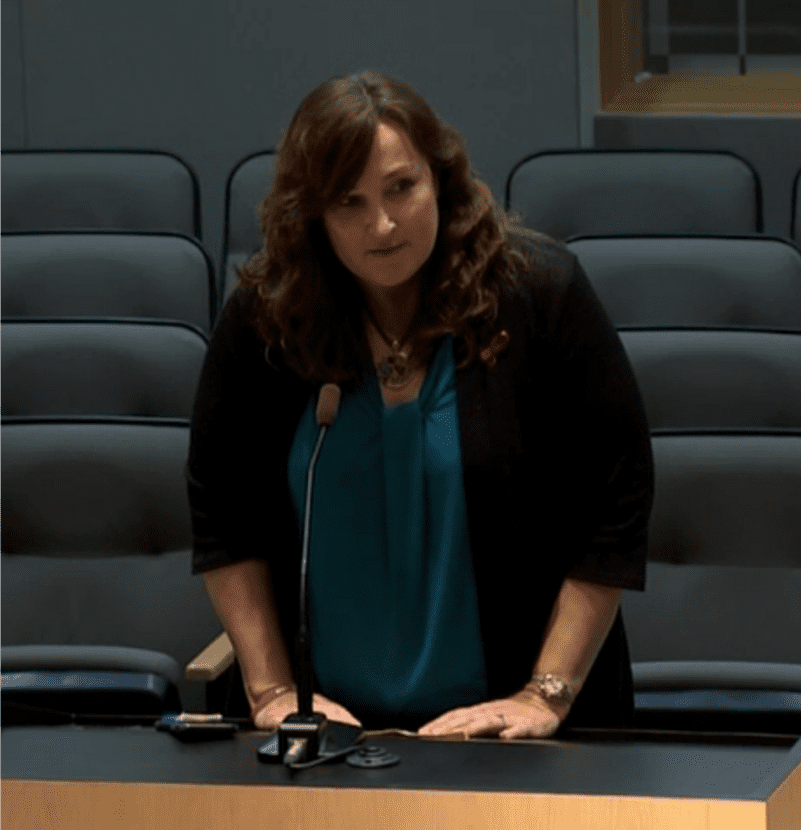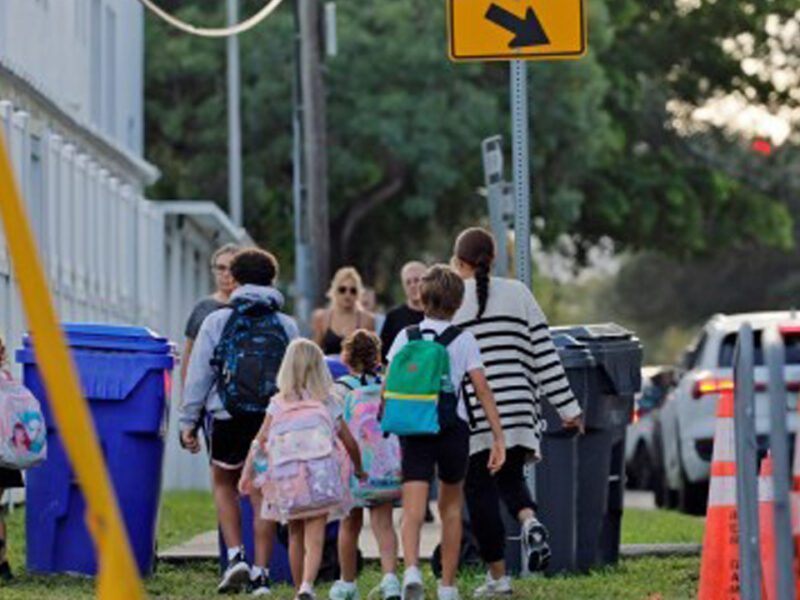New school safety bill focuses on identifying potential shooters, not access to guns
Miami Herald | By Mary Ellen Klas, Herald/Times Tallahassee Bureau | June 1, 2022
TALLAHASSEE
As the nation shudders from another inexplicable school shooting, Florida is moving forward with tweaks to its law relating to school safety, but the measure won’t touch the state’s gun laws.
A day after an 18-year-old gunman entered an elementary school in Uvalde, Texas, and killed 19 students and two teachers, the Florida Legislature sent HB 1421 to Gov. Ron DeSantis for his expected signature. The measure, passed during the regular legislative session, attempts to improve transparency around school emergencies, tightens requirements on who can serve as school safety officers, increases training relating to youth mental health and, for the first time, requires the Florida Department of Education’s Office of Safe Schools to adopt a plan for family reunification when K-12 public schools are closed or unexpectedly evacuated.
It’s thelatest update to the legislation passed in 2018 by the Republican-led Legislature in response to the shooting at Marjory Stoneman Douglas High School in Parkland that killed 17 students and education staff and injured 17 more.
At the time, Sen. Wilton Simpson, a Trilby Republican who has served as Senate president for the past two years, predicted: “The focus of this Legislature will be on this for many years to come.”
Haunted by what they saw in Parkland, Senate leaders worked with Democrats to pass the first restrictions on guns in Florida in a generation. They increased the age to possess a firearm in Florida from 18 to 21, banned bump stocks, imposed the state’s first “red flag” law that allows law enforcement to confiscate guns from people deemed to be a threat to themselves or others, gave schools the ability to arm school personnel, and created the Marjory Stoneman Douglas High School Public Safety Commission.
But the focus quickly shifted away from firearms and remained on how to harden schools, arm school personnel, and prevent kids from becoming shooters.
This year, Rep. Chris Latvala, R-Clearwater, chair of the House Education & Employment Committee handed Rep. Fred Hawkins, a St. Cloud Republican, a bill aimed at following up on some of the commission’s recommendations, particularly those focused on how schools can better respond in an active-shooter situation.
“I can’t guarantee another incident won’t happen, but if the school districts put everything in place we’re talking about, it can make a difference,’’ Hawkins said last week. “What we’re doing will save lives — but it comes down to we have to make sure we’re getting help to the people that need it before this takes place.”
Working with Rep. Christine Hunschofsky, a Democrat who was mayor of Parkland at the time of the shooting, they persuaded their colleagues to make the first significant changes to the “Marjory Stoneman Douglas High School Public Safety Act of 2018” and passed the bill that makes incremental changes to the existing law.
UNANIMOUS SUPPORT FOR CHANGES
Unlike the 2018 legislation, HB 1421 and its Senate companion, SB 802, received unanimous support in the House and Senate.
The measure will extend the life of the Marjory Stoneman Douglas High School Public Safety Commission until July 2026 to continue to assess school safety issues, monitor the implementation of the law, and provide oversight of the Office of Safe Schools.
“There is always more work to do,’’ Hunschofsky said, noting that, for example, there are not enough school psychologists available to meet the need for mental health assessments.

“It’s important to continue to talk to teachers, parents and principals to see what is going on out there,’’ she said. “There is often management by crisis, and we’re trying to make sure that we’re anticipating things before they happen.”
Hawkins, a former Osceola County commissioner who is president of the Osceola Education Foundation, said his commitment to the issue solidified for him when he met the families of the Parkland victims this year.
After meeting Tony Montalto, the president of the advocacy group Stand With Parkland and whose daughter Gina was killed in the shooting, Hawkins said he made a promise to keep the issue in focus as long as he remains in the Legislature.
“Tony reached out with tears in his eyes,’’ he recalled. “I thought he was going to shake my hand. He grabbed my hand and put a wristband on me. He said: ‘Do not take that off until you pass this.’ ”
Hawkins said that during the legislative session, he would see Montalto in the halls, “and I made sure to wear it every day. Those wristbands are on my dresser and they remind me every day to keep moving forward and to pray for those families.”
But Hawkins is like most of his Republican colleagues and struggles for an answer when asked what danger there is in restricting access to high-capacity guns and ammunition or requiring universal background checks to obtain a gun.
“I don’t have that answer,’’ he said. “How many people own guns for hunting and protection, have concealed weapons permits and they don’t use them to harm others? That’s what draws me back to it being somebody’s mental health, and so I will continue to focus on the fact that we make sure we are addressing the problem of the person’s mental health.”
STILL PUSHING FOR UNIVERSAL BACKGROUND CHECKS
By contrast, Hunschofsky supports national universal background checks on purchases of guns and ammunition because, she said, “only then will red flag laws be effective.” Since 2018, Florida’s “red flag” law had been used more than 3,500 times as of early 2020, according to the Associated Press.
One of the most important components of this year’s legislation is the mandate that schools create a family reunification plan in the midst of an emergency, Hunschofsky said.
After the shooting at Marjorie Stoneman Douglas High School, parents scrambled to get accurate information about their children for nearly 12 hours after the shooting “because we didn’t have a plan,’’ Hunschofsky recalled. “You also want to make sure that you’re picking a location where there’s privacy, so the parents can easily get their information and pick up their children and, when parents are possibly getting bad information, there’s private space for that.”
As information emerges from the tragedy in Uvalde, both Hawkins and Hunschofsky said they are acutely aware of the traumatic reminder it brings for the Parkland families.
“Communities that go through these school shootings are forever changed, and when another school shooting happens, it really traumatized all the other communities who’ve had school shootings before,’’ she said.
But there are lessons to be learned too, she added, noting that the Uvalde shooter allegedly entered the school througha door that was supposed to be locked but wasn’t.
“It’s important to adhere to safety protocols with fidelity,’’ Hunschofsky said. “When we say the door should be locked, there should be a single point of entry, then the doors should actually be locked and there should actually be a single point entry.”
MANY DISTRICTS NOT IN COMPLETE COMPLIANCE
Hawkins said that one troubling development in Florida is that, despite the recommendations and regulations imposed after the Parkland tragedy, the “majority of school districts were not in full compliance,” even though there is money set aside for schools to access.
“How much grace period will weallow them?’’ he asked. “That will be a decision for the next commissioner of education.”
Former state Sen. Manny Diaz Jr., of Hialeah, assumes that role on Wednesday, June 1.
Among the recommendations, the measure awaiting the governor’s approval would:
▪ Require the Florida Board of Education to adopt rules setting requirements for emergency drills including timing, frequency, participation, training, notification, and accommodations.
▪ Require that law enforcement responsible for responding to schools in the event of an assailant emergency be physically present and participate in active assailant drills.
▪ Require school safety and environmental incident reporting data be published annually in a uniform, statewide format that is easy to read and understand.
▪ Require safe-school officers that are sworn law enforcement officers to complete mental health crisis intervention training and at least 80% of school personnel to receive the mandatory youth mental health awareness training.
▪ Require safe-school officers that are not sworn law enforcement officers to receive training on incident response and de-escalation.
▪ Require that school district and local mobile response teams use the same suicide screening tool approved by the Department of Education.
▪ Require the Office of Safe Schools provide school districts information on the proper use of the School Safety Awareness Program, including the consequences of knowingly submitting false information.





